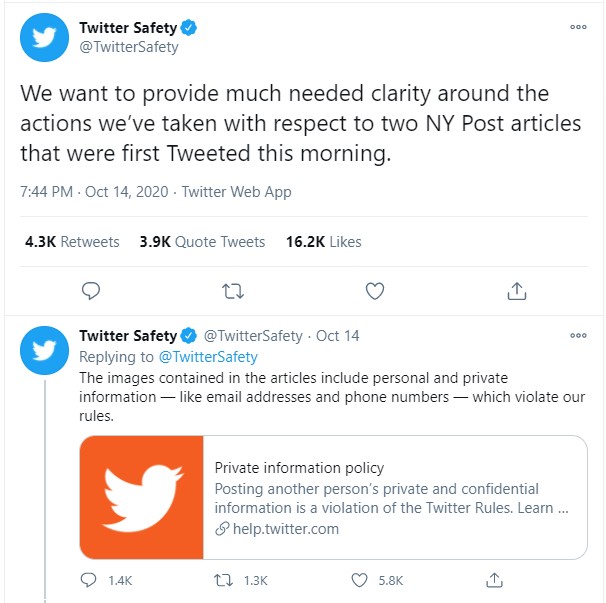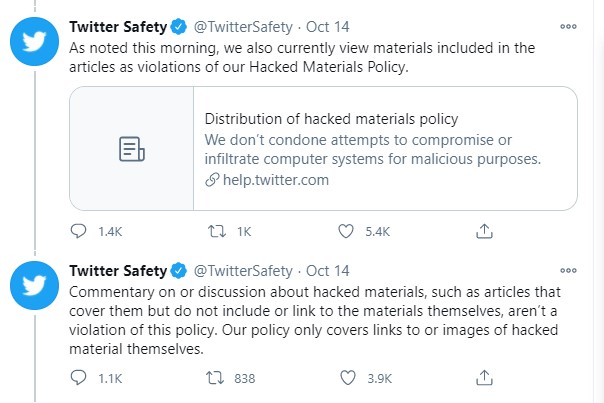
On Monday, attorneys for the owner of the Delaware-based computer shop who serviced Hunter Biden’s laptop filed suit in a Florida federal district court against Twitter for defamation. John Paul Mac Isaac’s lawsuit alleges Twitter defamed him by labeling him a hacker in an attempt to justify its censorship of The New York Post’s bombshell story exposing the younger Biden selling access to his father.
Three weeks before the 2020 presidential election, The New York Post shook the political landscape by reporting on a trove of emails found on an abandoned MacBook laptop belonging to Hunter Biden. “Hunter Biden discussed leveraging his connection to his father in a bid to boost his pay from a Ukrainian natural gas company, according to an email he sent around the time he joined the firm’s corporate board,” the Post’s Oct. 14, 2020 story opened. “In a lengthy memo to his then-business partner, Devon Archer, who already sat on the Burisma board, Biden repeatedly mentioned ‘my guy,’ while apparently referring to then-Vice President Joe Biden,” the first article in a series continued.
Replete with screen grabs of numerous emails and copies of photographs of Hunter and his family recovered from the laptop, the Post’s story quickly went viral. Quickly, however, Twitter and other social media outlets quashed the news that could have proven fatal to Joe Biden’s presidential aspirations.
Twitter suspended the Post’s account and prevented users from linking to the story in tweets and private massages. Then, seeking to justify its censorship of the Biden story against an avalanche of criticism, Twitter posted a thread clarifying its actions.
After noting the articles included personal and private information, in violation of Twitter’s rules, Twitter noted that it “currently views materials included in the articles as violations of our Hacked Materials Policy.” The social media giant stressed that its “policy only covers links to or images of hacked materials themselves.”


Twitter’s labeling of the materials in the Post’s story as “hacked materials” defamed Isaac, according to his complaint, by falsely branding him as a hacker.
Isaac had not “hacked” the computer hard drive, his complaint explained. He had legally obtained access to the materials, first when he was hired to retrieve the contents of the hard drive and then later when the owner abandoned the property by failing to retrieve it within 90 days. And it was only after the hard drive was abandoned that the material was published.
While the Post had not named Isaac in the articles, according to Isaac’s complaint, the Post coverage of the Biden scandal included a photograph of his Wilmington, Delaware store The Mac Shop, Inc., outing him as the store owner who had provided a copy of the hard drive from the laptop to former Mayor Rudy Giuliani’s lawyer, Robert Costello. Giuliani would later provide The Post a copy of the hard drive.
The backlash against Isaac was swift, according to his lawsuit, with negative reviews quickly flooding Yelp after Twitter branded him a “hacker.” He also began receiving personal threats and eventually was forced out of business. Isaac’s complaint seeks compensatory damages and requests punitive damages of $500 million.
Shortly after Isaac filed suit, federal judge Beth Bloom, a Barack Obama appointee, dismissed the lawsuit for lack of subject matter jurisdiction. As Bloom’s short order explained, the complaint had not identified Twitter’s principal place of business, and accordingly, the court could not assess whether it had “diversity jurisdiction” over the case.
Diversity jurisdiction refers to the power of a federal court to hear a case involving a question of state law, such as that at issue here, namely the state tort of defamation. Where a case involves state law, a federal court may hear the dispute only if the plaintiff and defendant are citizens of different states and the damages alleged exceed the statutorily specified amount of $75,000.
A corporation, like Twitter, is considered a citizen of the state in which it is incorporated, as well as the state where it has its principal place of business. Isaac, who lived in Delaware at the time of the defamation and is now a citizen of Colorado, inadvertently only identified Twitter’s place of incorporation, which is Delaware; it failed to identify in the complaint California as the location of Twitter’s headquarters.
Brian Della Rocca, a partner with the Maryland-based Compass Law Partners firm, told The Federalist that an amended complaint addressing the jurisdictional concerns will be filed soon.
At that point, all eyes will be on Twitter, whose leadership has since admitted under questioning by Sen. Ted Cruz that Jack Dorsey’s team made a mistake in blocking the URLs of the story in tweets and direct messages.
Twitter will likely seek refuge in Section 230 of the Communications Decency Act, which provides “interactive computer service” providers, such as Twitter, immunity. But Della Rocca see Isaac’s “case as unique,” telling The Federalist that Isaac’s legal team believes “the situation falls outside the immunities granted to Twitter by Section 230.”
The facts underlying Isaac’s lawsuit present solid grounds for sidestepping Section 230’s grant of immunity. Of relevance, first, is Section (C)(1), which makes clear that “interactive computer service” providers and users are not “treated as the publisher or speaker of any information provided by another information content provider.” But Isaac is not seeking to hold Twitter liable for what someone else posted on its platform, but for Twitter’s own speech.
Also of significance is the statutory language granting immunity to social media platforms. That sub-section states that “an interactive computer service,” such as Twitter, shall not be liable “on account of any action voluntarily taken in good faith to restrict access to or availability of material that the provider or user considers to be obscene, lewd, lascivious, filthy, excessively violent, harassing, or otherwise objectionable, whether or not such material is constitutionally protected.”
Isaac has good grounds to argue that Section 230 is irrelevant to his lawsuit because his claim of libel is not based on anything Twitter did “to restrict access to or availability of material.” Rather, according to Isaac, Twitter defamed him when it explained why it had blocked the Post’s articles on Hunter Biden: It was Twitter’s “clarification” that defamed Isaac by publicly branding the emails and photographs culled from his hard drive “hacked” material.
Now, Twitter will counter that the statutory grant of immunity applies broadly to “any action,” which it will maintain would include explaining the basis for restricting access to the Post’s article. That argument is a stretch, but it is a question of statutory interpretation for a court to decide as a matter of law and is likely one of first impression.
But Isaac’s case will then present a second question—and this question will be a factual one potentially for a jury: Did Twitter act in “good faith” in claiming the Post’s article included “hacked” materials? Here, Twitter may have a difficult time establishing it acted in “good faith” in banning the Post’s article for including “hacked” materials, given that it allowed The New York Times to promote, and users to share, the Times’ article on President Trump’s supposed tax returns.
Once Isaac’s lawsuit is refiled, Twitter will have some tough calls to make. Does it attempt to raise Section 230 as a defense, and risk discovery and a trial on the question of “good faith”? Or does it instead attempt to scuttle the libel suit on narrow state law grounds? Or does it attempt to settle the case and in the future not attempt to clarify its decisions?
The final option might best serve Twitter’s interests in the long run — both as a business desperate to keep Section 230 out of the spotlight, and as a Biden backer desirous of burying bad press for the would-be president.








